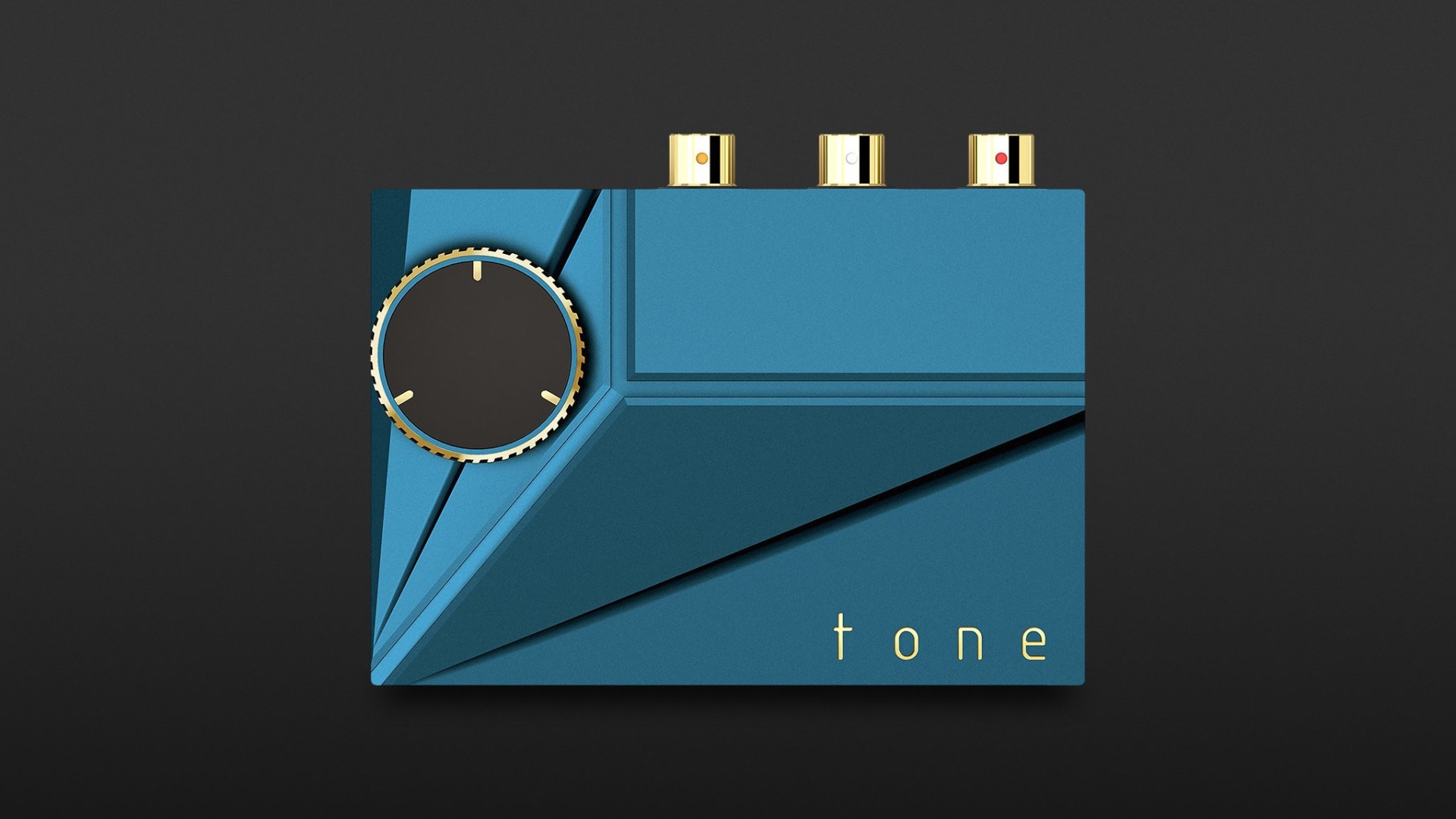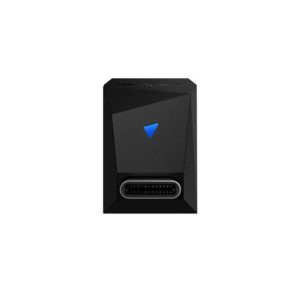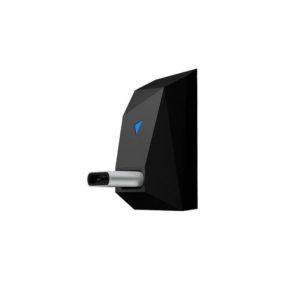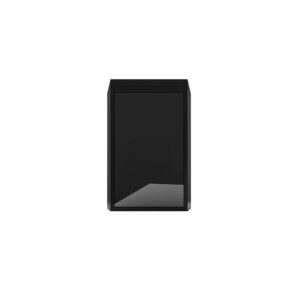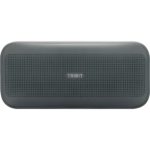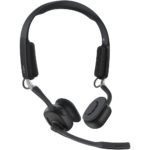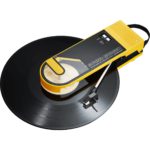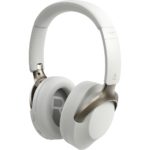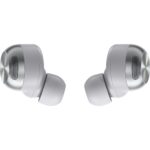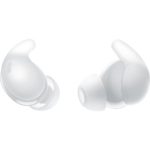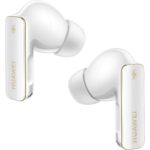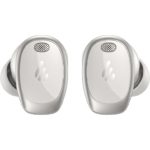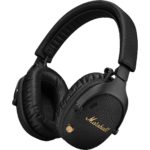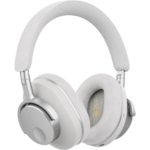Khadas has launched the Tone2, an extremely compact, portable D/A converter that can be flexibly operated with computers, mobile devices or single-board computers and can process audio data with up to 32Bit/768kHz and DSD 512. The multiple I/O interface of the mini DAC also has a specially developed symmetrical RCA output.
- Lightweight, portable mini desktop format
- Flexible power supply
- Up to 32Bit/768kHz and DSD 512
- Low noise
- Switchable inputs: USB, S/PDIF (coaxial) & Bluetooth (optional)
- Outputs: RCA (unbalanced or balanced)
- Rather confusing operation
- D/A conversion does not work perfectly with all devices
- No USB adapter included
While in the hi-fi market Khadas may still be one of the newcomers, the manufacturer has nevertheless already made a name for itself in the SBC (single board computer) sector and for example, offers alternatives to the Raspberry Pi with the VIM3 and VIM4. It is, therefore, not surprising that the Tone2 is offered not only as a desktop device but also as a “maker kit” that is compatible with Khadas’ single-board computers.
As a desktop device, the Khadas Tone2 weighs just 96 grams and impressed us with very its small dimensions of 88 millimetres in width, 68 millimetres in length (including the RCA connectors) and 18 millimetres in height. This means that this mini DAC can easily be carried in a jacket pocket. The device gave the impression of being robust and appeared to be impeccably finished.
The features of the Khadas Tone2
All of this mini DAC’s connections can be found on the rear panel. USB and S/PDIF (coaxial) digital inputs are available as standard, which means that you can use a CD player as your player. Furthermore, the range of applications can be extended with an optionally available Bluetooth module, called “BT Magic”, which is placed on the second USB-C interface (I2S). You can also vary the power supply; this can be provided via one of the two USB-C ports depending on the application, and a power bank can be connected to the I2S port for mobile use.
A special feature of the Khadas Tone2 is that the signal at the analogue RCA output can be either unbalanced or balanced. This development by the manufacturer is much more space-saving compared to XLR outputs but requires their own “Balanced RCA Male to XLR-3 Male” audio cable for balanced transmission, and these are currently priced at over 80 EUR. Alternatively, Khadas also offer an adapter available for 65 EUR. However, you can also connect active monitor speakers and hi-fi or headphone amplifiers to the RCA output using unbalanced cables.
Operation
This Mini-DAC’s multifunctional operating component is a rotary control, which can also be pressed like a button from the rear of the device to the front. The system is switched on with a single press and switched off by holding the button down. A double press switches between volume control and track navigation as well as input and filter selection. If there are setting options within each mode, these are indicated by a single or multi-coloured LED ring below the control, although this was not clearly visible in all lighting conditions or from every perspective.
While playback can be controlled via the button function, you can also skip tracks forwards and backwards by turning the knob. However, when controlling the volume, the single-colour RGB lighting visualises different setting ranges in 20 per cent increments. The digital input’s multi-coloured display is more complex, with the option to switch between “USB”, “S/PDIF”, “I2S”, “GPIO (I2S)” and “Auto” by turning the knob. With a total of seven options, this operating concept for filter selection ultimately seemed overstretched and rather confusing. By contrast, it was a practical feature that the rotary control could be locked by pressing it three times.
Khada’s BT Magic
The Bluetooth module, which is optionally available for 56 EUR, was also very small in line with the mini housing of the desktop-sized Tone2. The advantage of this is a broad repertoire of audio codecs are supported, with SBC, AAC, aptX, aptX LL, aptX HD and LDAC all on offer. Even better, the centrally positioned LED on the BT Magic uses a colour code to indicate which format is being used. Bluetooth 5.1 may no longer seem cutting-edge, but the wireless connection proved to be stable over a distance of up to ten metres, even across several rooms.
In practice
According to the specifications, the Khadas Tone2 supports Windows 7/8/10/11, macOS, Linux (with a UAC2-compliant kernel), Android and iPadOS. An ASIO driver from the manufacturer is required for use on a PC, but the mini DAC can be used straight out of the box with a Mac. When used in combination with mobile devices, we would recommend using an external power supply, as the device battery will otherwise quickly run out, although this Mini Desktop DAC can also be operated with an iPhone using a “Lightning to USB 3 camera adapter”. One drawback is that playback on a Nothing Phone was either slowed down or distorted if the audio resolution was above 24 bit/44.1kHz, but this could be rectified with a firmware update. With an Apogee Groove, however, the playback of higher-resolution material on the Nothing Phone worked perfectly.
On the positive side, we noticed that the D/A converter was extremely low noise considering its price range. In combination with a headphone amplifier such as the Lehmann Audio Linear, no background noise was noticeable, which also made it possible to listen with a sensitive IEM such as the Sennheiser IE 100 Pro. This was the same if the coaxial digital input was used instead of the USB port, and a CD player such as the Yamaha CD-S303 was used as a player.
Sound of the Khadas Tone2
It was immediately noticeable that the Khadas Tone2 provided a much larger listening space compared to mobile devices or the standard output of a computer. Even with studio productions such as “Rose Rouge” (Tourist) by St Germain, the sound expanded, which allowed the individual instruments to be located more freely in the room and created a more open sound impression. Regardless of whether you are using active speakers, a hi-fi system or headphones, the reproduction was also clearer, more playful and more detailed. On top of this, the sound image appeared somewhat brighter.
Even clearer differences were recognisable with live recordings such as Gregory Porter’s interpretation of “It’s Probably Me” (Polar Music Prize, Stockholm 2017). This mini DAC used in combination with the Linear from Lehmann Audio can create a significantly more realistic concert atmosphere with a corresponding spatial depth, especially with headphones noted for their spatial imaging capabilities, such as a DT 990 Pro or DT 1990 Pro from Beyerdynamic. In contrast, direct playback via a laptop or smartphone was downright dull, cramped and one-dimensional.
Even with a classic like “Yesterday” from the compilation “The Beatles 1962-1966” (2023 Edition), the listening impression changed. When switching to the Tone2, the previously quite present, superficial vocal reproduction moved a little further back to embed itself in the arrangement. The more homogeneous reproduction brought all the players into focus, and the vocals were no longer “quietly” in the background.
A characteristic feature of the mini desktop DAC is that it does not tend to emphasise the lower frequency range. Instead, it aims to achieve balanced, unadulterated reproduction, as a D/A converter should do. And the Tone2 undoubtedly fulfils this task.
Conclusion
Although the Khadas Tone2 does not yet appear to be fully developed, we can look forward to seeing what else the SBC manufacturer will bring to the hi-fi sector. Their own ideas, such as implementing a balanced RCA output, create new options and enrich the market. In addition, the mini desktop DAC can distinctly enhance the sound reproduction of computers and mobile devices with a pleasingly low noise level. However, the D/A conversion does not yet work perfectly with all devices. There is also room for improvement with the somewhat confusing operating concept.
Technical specifications
- Ear couplingDAC/amplifier
- TypeDesktop
- Weight without cable96 g
- Cable length100 cm
What's in the box
- USB-C cable
Special features
- Available in black, blue and as maker kit
- XMOS XU208 processor (8 cores)
- ESS ES9038Q2M DAC
- 2x TI OPA1612 operational amplifiers
- 2x Ricore RT6862 operational amplifiers



